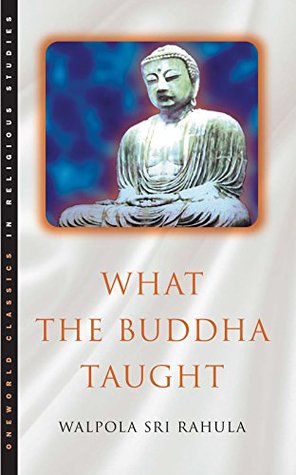More on this book
Community
Kindle Notes & Highlights
Among the founders of religions the Buddha (if we are permitted to call him the founder of a religion in the popular sense of the term) was the only teacher who did not claim to be other than a human being, pure and simple.
Andrea Dafne Gaggioli liked this
Man’s position, according to Buddhism, is supreme. Man is his own master, and there is no higher being or power that sits in judgment over his destiny.
The freedom of thought allowed by the Buddha is unheard of elsewhere in the history of religions. This freedom is necessary because, according to the Buddha, man’s emancipation depends on his own realization of Truth, and not on the benevolent grace of a god or any external power as a reward for his obedient good behaviour.
This spirit of tolerance and understanding has been from the beginning one of the most cherished ideals of Buddhist culture and civilization. That is why there is not a single example of persecution or the shedding of a drop of blood in converting people to Buddhism, or in its propagation during its long history of 2500 years. It spread peacefully all over the continent of Asia, having more than 500 million adherents today. Violence in any form, under any pretext whatsoever, is absolutely against the teaching of the Buddha.
Almost all religions are built on faith—rather ‘blind’ faith it would seem. But in Buddhism emphasis is laid on ‘seeing’, knowing, understanding, and not on faith, or belief.
The Buddha was not interested in discussing unnecessary metaphysical questions which are purely speculative and which create imaginary problems. He considered them as a ‘wilderness of opinions’.
First of all, Buddhism is neither pessimistic nor optimistic. If anything at all, it is realistic, for it takes a realistic view of life and of the world. It looks at things objectively (yathābhütaṃ). It does not falsely lull you into living in a fool’s paradise, nor does it frighten and agonize you with all kinds of imaginary fears and sins.
The Buddha declared in unequivocal terms that consciousness depends on matter, sensation, perception and mental formations, and that it cannot exist independently of them.
The idea of moral justice, or reward and punishment, arises out of the conception of a supreme being, a God, who sits in judgment, who is a law-giver and who decides what is right and wrong. The term ‘justice’ is ambiguous and dangerous, and in its name more harm than good is done to humanity. The theory of karma is the theory of cause and effect, of action and reaction; it is a natural law, which has nothing to do with the idea of justice or reward and punishment.
Nirvāṇa is definitely no annihilation of self, because there is no self to annihilate. If at all, it is the annihilation of the illusion, of the false idea of self.
Two ideas are psychologically deep-rooted in man: self-protection and self-preservation. For self-protection man has created God, on whom he depends for his own protection, safety and security, just as a child depends on its parent. For self-preservation man has conceived the idea of an immortal Soul or Ātman, which will live eternally. In his ignorance, weakness, fear, and desire, man needs these two things to console himself. Hence he clings to them deeply and fanatically.


